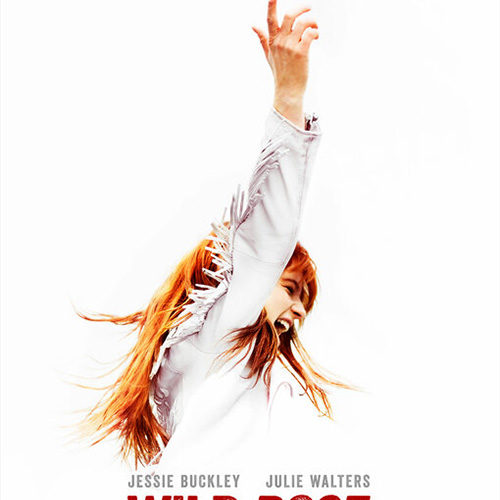Tom Harper’s Wild Rose is a film whose fixation on authenticity is directly at odds with its own craft. A corrective to the recent spate of self-absorbed superstar narratives, this is an underdog-musician story that’s appealingly as much about responsibility as sex and drugs, even as it’s repeatedly hamstrung by overly sentimental direction– a saccharine tone all the more disappointing given the strength of an alternately brittle and soulful script from TV veteran Nicole Taylor.

With cowboy boots high enough for Dolly Parton, pipes like Loretta Lynn, and a chip on her shoulder a mile wide from a half-lifetime of bad choices, the crimson haired Rose-Lynn (meteoric star Jessie Buckley) is the picture of Country’s outlaw spirit. In house arrest after being picked up for a less-than-legal delivery job, she’s now poorly acclimating to her old life as a mother of young son and daughter. She dreams of performing in Nashville, jagging in and out of the lives of those around her, but her circumstances hardly allow her to be a country star.
Chastised by her upright mother, Marion (Julie Walters), on her return, Rose’s daughter stonewalls her as an act of rebellion and her son cries hysterically at the possibility of being left with mom instead of grandma. There’s familiar ingredients at play here in Walters’ disapproval of her daughter’s musical dreams but the issue asserts itself in either unexpected contexts or with an unhurried drama. The tone likewise flirts with kitchen sink drama, but it’s less about a hardscrabble life than trying to tolerate or even enjoy the life you’ve made for yourself.
Performing nightly–when she doesn’t start a brawl–to an uninvested crowd at Glasgow’s version of the Grand Ole Opry, Rose spends her days as a housekeeper at the lavish home of Susannah, an earnest women with connections and a soft spot for Rose’s lovably coarse personality. Rose isn’t above taking advantage of her–talking her way into higher wages by claiming that the other maid is on the dole, raiding the house liquor cabinet as soon as she’s left the driveway. The script partly posits these moments of acting out as immaturity, but they’re more complicated defense mechanisms. It’s the same impulse that causes her to abandon her children and go on a bender at the stickiest bar imaginable after promising them she was going out to get pizza.
Which falls in line with the commendable messiness to how the film sketches Rose’s relationship to her own circumstances. She doesn’t live a hard life–just one that’s perpetually unlucky, held back by vices and her own lack of self-confidence. There’s a satisfying reciprocity to the arc of Rose’s more flawed tendencies that doesn’t align with the often punitive or overly easy underdog stories.

That doesn’t mean that narrative contrivances don’t occasionally swallow up some of the thornier edges of the narrative, whether it’s characters who just happen to know others or things that work out better despite all evidence to the contrary. But there’s sharp and more cynical commentary to at least some of this as Susannah manages to get Rose an interview with her idol, BBC radio host Bob Harris, through a few emails even as Rose has tried for years to even be booked in her own town. A late narrative detour also brings in a refreshing emotional reality by keeping Rose’s story grounded without crushing her in the process.
Unfortunately, with the exception of one scene where a cleaning session turns into an insular jam session inside Susannah’s house, Harper’s direction is frustratingly programmatic, especially as it relates to capturing the music. The first eureka moment of Rose’s talent is shot entirely with lingering close ups while a climactic scene pores over every inch of a space in a ponderous way. These moments threaten to sap the film of its power but Buckley is without a doubt a star. A winner of an Australian talent competition, she not only has the pipes (Rose-Lynn’s style is a mixture between Lucinda Williams and more outlaw country contemporaries like Miranda Lambert) but more crucially, the presence, to elevate the more formulaic direction.
So it is, repeatedly, the direction that keeps Wild Rose from being something special. Time and again, Harper’s input is overactive, striving for a to-the-rafters sensibility instead of letting the moment sing on its own. But in the rare moments when this just becomes a film about a woman who loves country music with every fiber of her being, it separates itself and becomes far more than just another story about a star being born.
Wild Rose is now playing in limited release.

